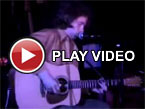
The mark of an exceptionally visual film director is that every frame
could stand alone as a great photograph, poster or post card. With the
exception of 'Lost Highway', David Lynch has seemingly held on to this
skill. In the style of his most popular films, he sets up this story as
a mystery, wrapped inside an enigma. Set in the Hollywood Hills, a
woman is the only survivor of a car accident but is left wandering with
amnesia. By chance she happens upon a vacant apartment (as the renter
is vacating) and hides out until she's discovered by a wholesome
passenger who gets sucked into the rollercoaster ride. Lynch has an
undeniable mastery of all elements as the score, sound effects,
characters and camera shots all play into a twisted story of the
hyperphysical underground of a shallow business: filmmaking! Popular
Lynch elements also come into play: the use of coffee, unexplained
objects, the name Diane, red stage curtains, death and light, invented
(as opposed to strategically placed for advertisement purposes)
products, off-camera people answering on-camera phones knowing who the
other caller is when they pick up, and of course Roy Orbison. (Rebekah
Del Rio's a'capella Spanish rendition of "Crying" has got to be one of
the most captivating moments of the film.) Betty and Rita are the
innocents playing detective, selflessly trying to help each other out
and uncover the mystery, yet Diane and Camilla are the alter-egos,
guilty as sin and driven by selfish desires. As complex as the plot
seems, this film is basically about deceit, but on many levels however.
Not only are the characters deceiving each other, they are deceiving
themselves while David Lynch is completely deceiving the audience into
believing which part of this film is reality and which part is fantasy.
At the end it's up to you to decide which is which.
 The mark of an exceptionally visual film director is that every frame
could stand alone as a great photograph, poster or post card. With the
exception of 'Lost Highway', David Lynch has seemingly held on to this
skill. In the style of his most popular films, he sets up this story as
a mystery, wrapped inside an enigma. Set in the Hollywood Hills, a
woman is the only survivor of a car accident but is left wandering with
amnesia. By chance she happens upon a vacant apartment (as the renter
is vacating) and hides out until she's discovered by a wholesome
passenger who gets sucked into the rollercoaster ride. Lynch has an
undeniable mastery of all elements as the score, sound effects,
characters and camera shots all play into a twisted story of the
hyperphysical underground of a shallow business: filmmaking! Popular
Lynch elements also come into play: the use of coffee, unexplained
objects, the name Diane, red stage curtains, death and light, invented
(as opposed to strategically placed for advertisement purposes)
products, off-camera people answering on-camera phones knowing who the
other caller is when they pick up, and of course Roy Orbison. (Rebekah
Del Rio's a'capella Spanish rendition of "Crying" has got to be one of
the most captivating moments of the film.) Betty and Rita are the
innocents playing detective, selflessly trying to help each other out
and uncover the mystery, yet Diane and Camilla are the alter-egos,
guilty as sin and driven by selfish desires. As complex as the plot
seems, this film is basically about deceit, but on many levels however.
Not only are the characters deceiving each other, they are deceiving
themselves while David Lynch is completely deceiving the audience into
believing which part of this film is reality and which part is fantasy.
At the end it's up to you to decide which is which.
The mark of an exceptionally visual film director is that every frame
could stand alone as a great photograph, poster or post card. With the
exception of 'Lost Highway', David Lynch has seemingly held on to this
skill. In the style of his most popular films, he sets up this story as
a mystery, wrapped inside an enigma. Set in the Hollywood Hills, a
woman is the only survivor of a car accident but is left wandering with
amnesia. By chance she happens upon a vacant apartment (as the renter
is vacating) and hides out until she's discovered by a wholesome
passenger who gets sucked into the rollercoaster ride. Lynch has an
undeniable mastery of all elements as the score, sound effects,
characters and camera shots all play into a twisted story of the
hyperphysical underground of a shallow business: filmmaking! Popular
Lynch elements also come into play: the use of coffee, unexplained
objects, the name Diane, red stage curtains, death and light, invented
(as opposed to strategically placed for advertisement purposes)
products, off-camera people answering on-camera phones knowing who the
other caller is when they pick up, and of course Roy Orbison. (Rebekah
Del Rio's a'capella Spanish rendition of "Crying" has got to be one of
the most captivating moments of the film.) Betty and Rita are the
innocents playing detective, selflessly trying to help each other out
and uncover the mystery, yet Diane and Camilla are the alter-egos,
guilty as sin and driven by selfish desires. As complex as the plot
seems, this film is basically about deceit, but on many levels however.
Not only are the characters deceiving each other, they are deceiving
themselves while David Lynch is completely deceiving the audience into
believing which part of this film is reality and which part is fantasy.
At the end it's up to you to decide which is which.


